
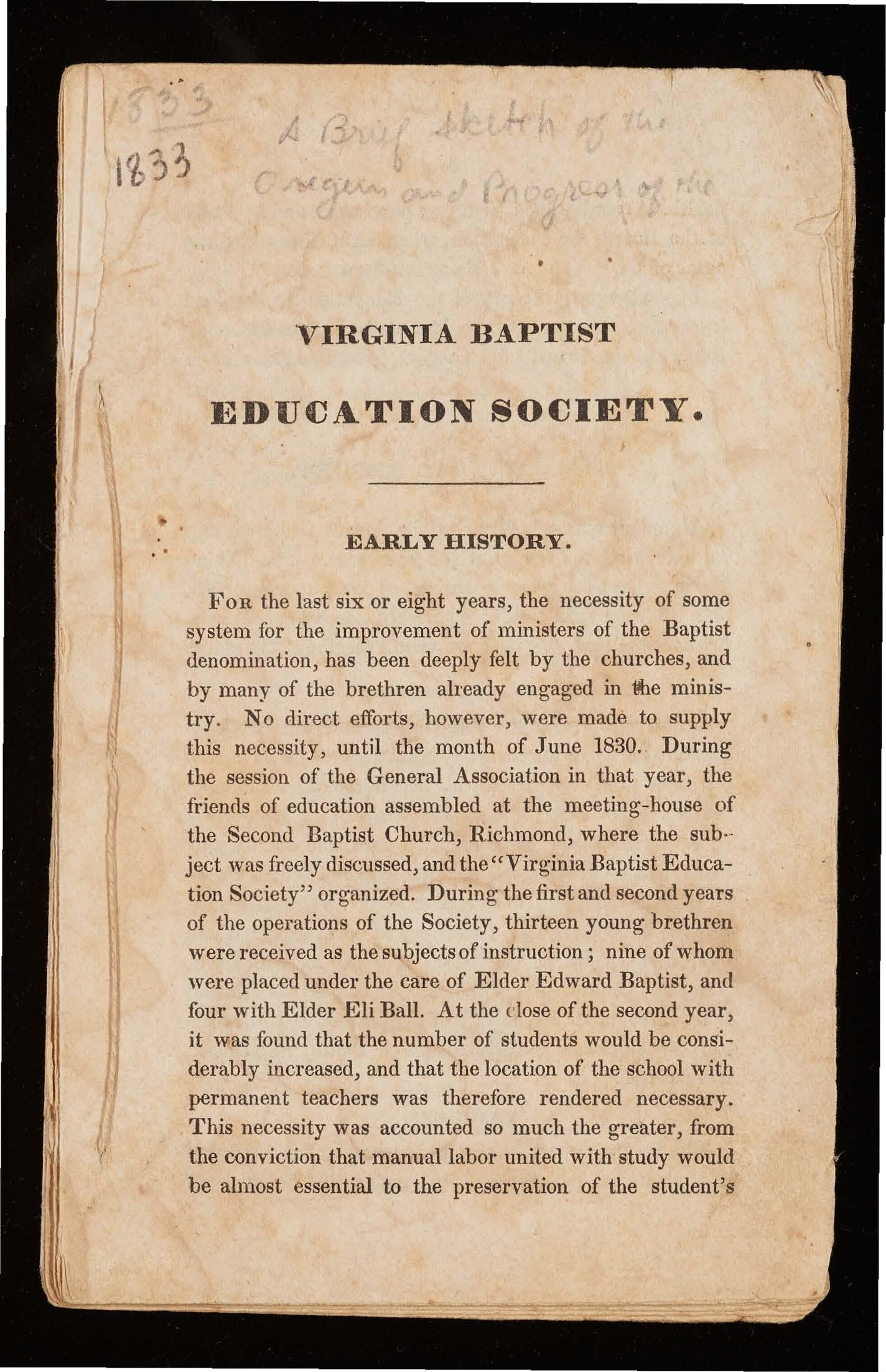



FoR the last six or eight years, the necessity of some system for the improvement of ministers of the Baptist denomination, has been deeply felt by the churches, and by many of the brethren all'eady engaged in ihe ministry. No direct efforts, however, were made to supply this necessity, until the month of June 1830. During the session of the General Association in that year, the friends of education assembled at the meeting-house of the Second Baptist Church, Richmond, where the sub ·· ject was freely discussed, and the "Virginia Baptist Education Society" organized. During the first and second years of the operations of the Society, thirteen young brethren were received as the subjects of instruction; nine of whom were placed under the care of Elder Edward Baptist, and four with Elder Eli Ball. At the dose of the second year, it was found that the number of students would be considerably increased, and that the location of the school with permanent teachers was therefore rendered necessary. This necessity was accounted so much the greater, from the conviction that manual labor united with study would be almost essential to the preservation of the student's
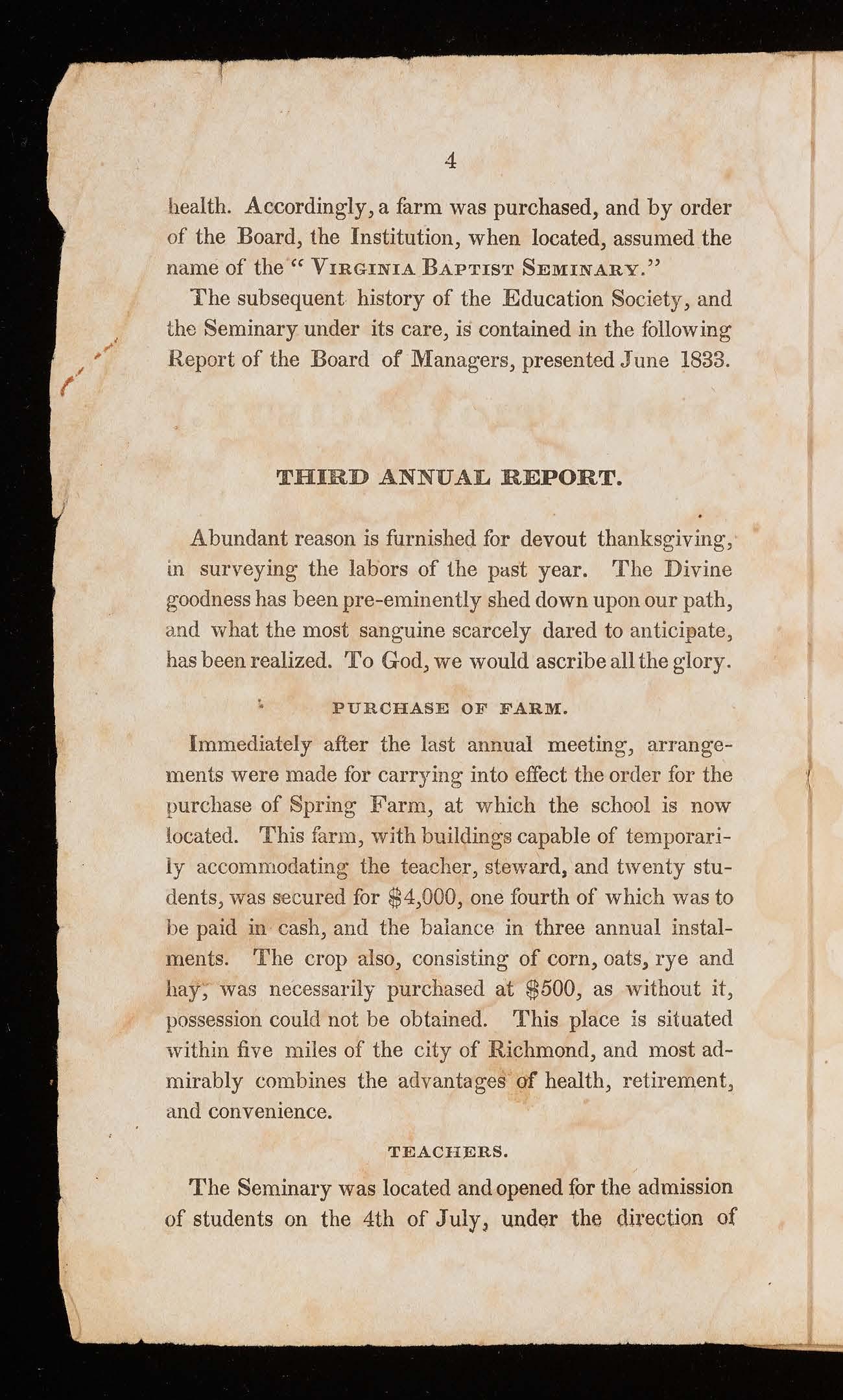
health. Accordingly, a farm was purchased, and by order of the Board, the Institution, when located, assumed the name of the" V1RGINIABAPTIST SEMINARY."
The subsequent history of the Education Society, and the Seminary under its care, is contained in the following Report of the Board of Managers, presented June 1833.
Abundant reason is furnished for devout thanksgiving, in surveying the labors of the past year. The Divine goodness has been pre - eminently shed down upon our path, a nd what the most sanguine scarcely dared to anticipate, has been realized. To God, we would ascribe all the glory.
Immediately after the last annual meeting, arrangements were made for carrying into effect the order for the purchase of Spring Farm, at which the school is now located. This farm, with buildings capable of temporarily accommodating the teacher, steward, and twenty students, was secured for $4,000, one fourth of which was to be paid in cash, and the balance in three annual instalments. The crop also, consisting of corn, oats, rye and hay, was necessarily purchased at $500, as without it, possession could not be obtained. This place is situated within five miles of the city of Richmond, and most admirably combines the advantages of health, retirement, and convenience.
The Seminary was located and opened for the admission of students on the 4th of July, under t he direction of

Elder Robert Ryland, whose appointment to this office, was made known at the last annual meeting. In the infancy of the institution, he found himself laboring under peculiar disadvantages, and the board cannot but express their warmest approval of his application and self-denial in the discharge of his important duties. Within a few months, your managers have had under serious consideration the propriety of obtaining the services of an additional teacher . . It was found, that arising from the various grades of improvement among the students, and the diversity of studies pursued, a burden too heavy was laid on one teacher, and that little or no attention could be paid to the study of the sacred volume. The exigencies of the case seemed to be too great, not to be regarded. Accordingly, at a meeting of the board held on the 8th of April , Elder Eli Ball was chosen assistant teacher of the Sem inary. This appointment has been accepted, and the duties of his station have been entered upon by brother Ball.
The management of the farm was committed to a steward employed for that purpose, when the school was located'. Under his superintendence were placed the labor and board of the students, &c. whilst the board furnished farming utensils, articles of house-keeping, groceries, &c. for the support of the family . It was found, however, that this plan created too much division of responsibility. At the opening of the present session, an entirely different system was adopted; and the board is now furnished at a stipulated price for each student, for which your managers make themselves accountable.
At the opening of the school at Spring Farm in July last, the number of students did not exceed ten, before the
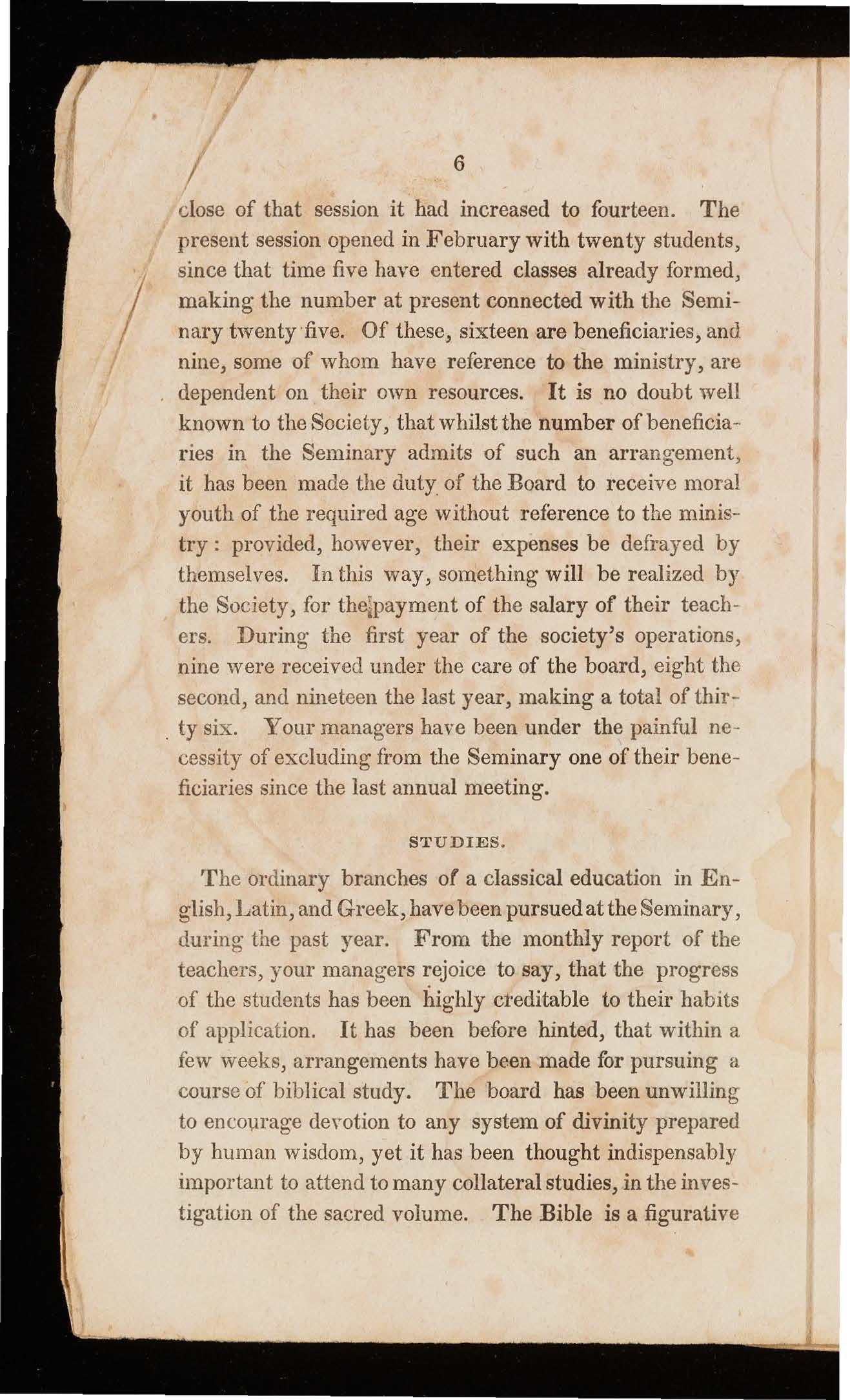
Isession it had increased to fourteen . The present session opened in February with twenty students, since that time five have entered classes already formed, making the number at present connected with the Seminary twenty five. Of these, sixteen are beneficiaries, and nine, some of whom have reference to the ministry, are dependent on their own resources. It is no doubt well known to the Society, that whilst the number of beneficiaries in the Seminary admits of such an arran gement , it has been made the duty of the Board to receive moral youth of the required age without reference to the ministry : provided, however, their expenses be defrayed by themselves. In this way, something will be realized by the Society, for thelpayment of the salary of their teachers. During the first year of the society's operations, nine were received under the care of the board, eight the second, and nineteen the last year, making a total of thirty six. Your managers have been under the painful necessity of excluding from the Seminary one of their beneficiaries since the last annual meeting.
The ordinary branches of a classical education in English, Latin, and Greek, have been pursued at the Seminary, during· the past year. From the monthly report of the teachers, your managers rejoice to say, that the progr ess of the students has been highly creditable to their habits of application. It has been before hinted, that within a few weeks, arrangements have been made for pursuing a course of biblical study. The board has been unwilling to encoµrage deyotion to any system of divinity prepared by human wisdom, yet it has been thought indispensably important to attend to many collateral studies, in the investigation of the sacred volume. The Bible is a figurative
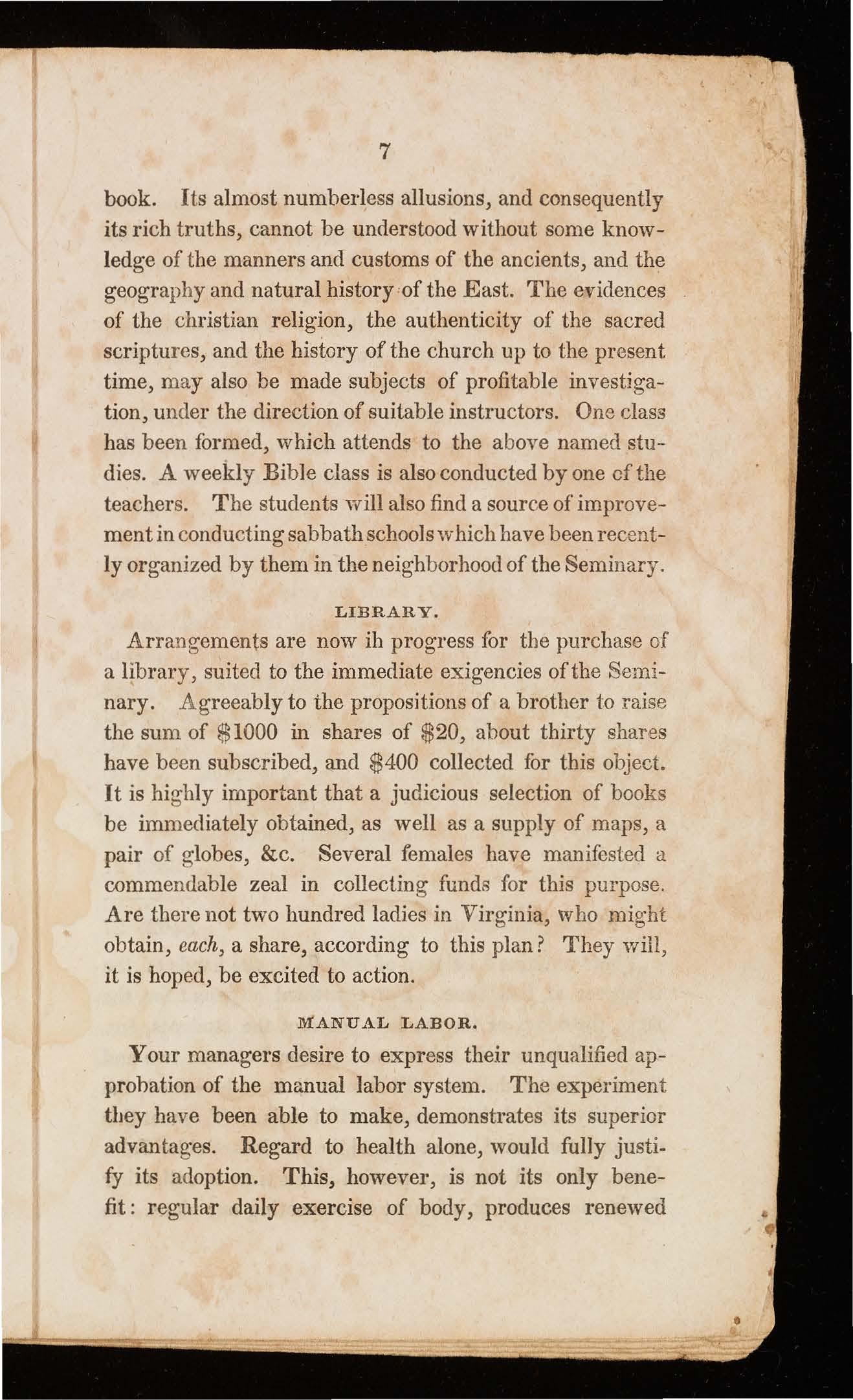
book. Its almost numberless allusions, and consequently its rich truths, cannot be understood without some knowledge of the manners and customs of the ancients, and the geography and natural history of the East. The evidences of the christian relig·ion, the authenticity of the sacred scriptures, and the history of the church up to the present time, may also be made subjects of profitable investigation, under the direction of suitable instructors. One class has been formed, which attends to the above named studies. A weekly Bible class is also conducted by one cf the teachers. The students will also find a source of improvement in conducting sabbath schoolswhich have been recently organized by them in the neighborhood of the Seminary.
LIBRARY.
Arrangements are now ih progress for the purchase of a library, suited to the immediate exigencies ofthe Seminary. Ag reeably to the propositions of a brother to raise the sum of $1000 in shares of $20, about thirty shares have been subscribed, and $400 collected for this object. It is highly important that a judicious selection of books be immediately obtained, as well as a supply of maps, a pair of globes, &c. Several females have manifested a commendable zeal in collecting funds for this purpose. Are there not two hundred ladies in Virginia, who might obtain, each, a share, according to this plan? They will, it is hoped, be excitecl to action.
MANUAL LABOR.
Your managers desire to express their unqualified approbation of the manual labor system. The experiment they have been able to make, demonstrates its superior advantages. Regard to health alone, would fully justify its adoption. This, however, is not its only benefit: regular daily exercise of body, produces renewed
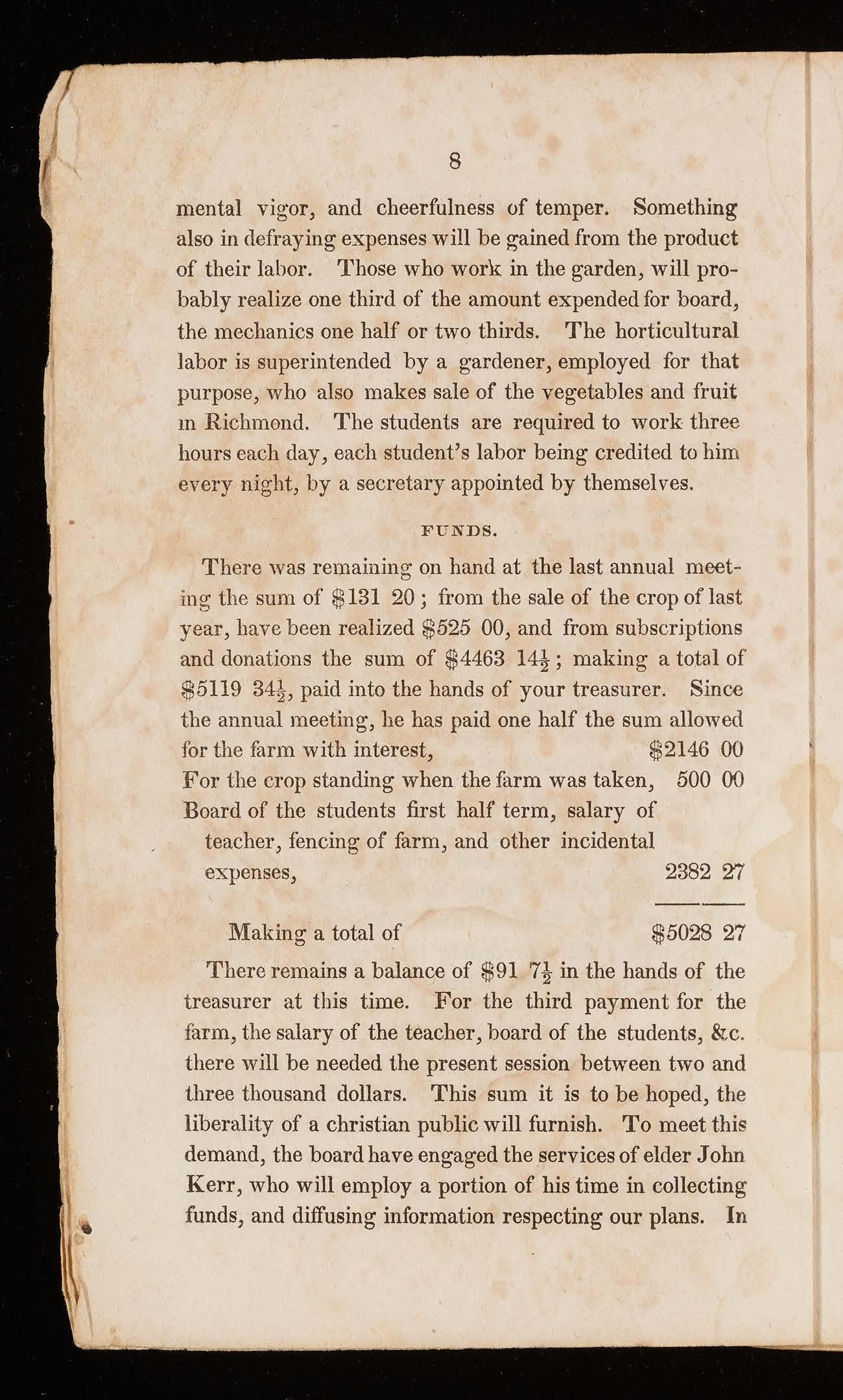
mental vigor, and cheerfulness of temper. Something also in defraying expenses will be gained from the product of their labor. Those who work in the garden, will probably realize one third of the amount expended for board, the mechanics one half or two thirds. The horticultural labor is superintended by a gardener, employed for that purpose, who also makes sale of the vegetables and fruit m Richmond. The students are required to work three hours each day, each student's labor being credited to him every night, by a secretary appointed by themselves.
There was remaining on hand at the last annual meeti ng the sum of $131 20; from the sale of the crop oflast year, have been realized $525 00, and from subscriptions and donations the sum of $4463 14½; making a total of $5119 34½, paid into the hands of your treasurer. Since the annual meeting, he has paid one half the sum allowed for the farm with interest, $2146 00
For the crop standing when the farm was taken, 500 00 Board of the students first half term, salary of teacher, fencing of farm, and other incidental expenses, 2382 'X'/
Making a total of $5028 27
There remains a balance of $91 7½ in the hands of the treasurer at this time For the third payment for the farm, the salary of the teacher, board of the students, &c . there will be needed the present session between two and three thousand dollars. This sum it is to be hoped, the liberality of a christian public will furnish. To meet this demand, the board have engaged the services of elder John Kerr, who will employ a portion of his time in collecting funds, and diffusing information respecting our plans. In

connection with this part of their report, your managers will state, that the propriety of not requiring the sum expended in the board of the students up to the beginning of the present session has been agitated. It is the almost unanimous opinion of the board, that while the tuition fee should not be required of beneficiaries, the sum furnished for their board should be returned, whenever providence shall allow an opportunity, except when chur ches or societies become responsible. Though this has been dec ided on, it has been deemed just, that in consequence of disadvantages labored under during the revival in Powhatan, whatever may now be due by the students previous to the location of the school, should not be required.
In thus far reviewing the ground which has been trodden, we may be encouraged to persevere. Though much has been effected by the efforts of the Education Society, there is much yet to be done. By an estimate recently made, the State of Virginia has four hundred and thirty churches of the Baptist denomination, and only two hundred and sixty one ordained and li censed ministers. It cannot be concealed too, that a large number of these are illiteral, and to a very considerable extent, unqualified for the work in which they are engaged. This is conceded and regretted by our ministering brethren themselves; who are in different parts of the state commendably applying themselves to the improvement of their own minds, thus making amends to some degree, for the want of early education. It is peculiarly gratifying to observe that a large number of our uneducated ministers are among the warmest friends of thjs society. Looking then at the abundance of the harvest and the fewness of the laborers, it becomes us with renewed energy, to apply ourselves to

the work. Let us aim, not to make ministers, but to furnish facilities for the improvement of those whom God shall call, and send forth. Let us be anxious, not to afford fuel for the flame of pride and van.ity, but so to inform and improve the minds of our young ministers, as shall cause them with becoming humility, to see and deplore their ignorance-not to encourage sloth, and prepare a set of drones to fatten on the liberality of our churches, but to qualify our brethren to become workmen and laborers in the cause of the Redeemer. By having every thing connected with the institution of the plainest, simplest character, and by the combination of manual labor with study, we may reasonably hope, under the blessing of God, that this will be effected, and that a large number will be qualified for laborious exertion, not only at home, but in different parts of the heathen world .
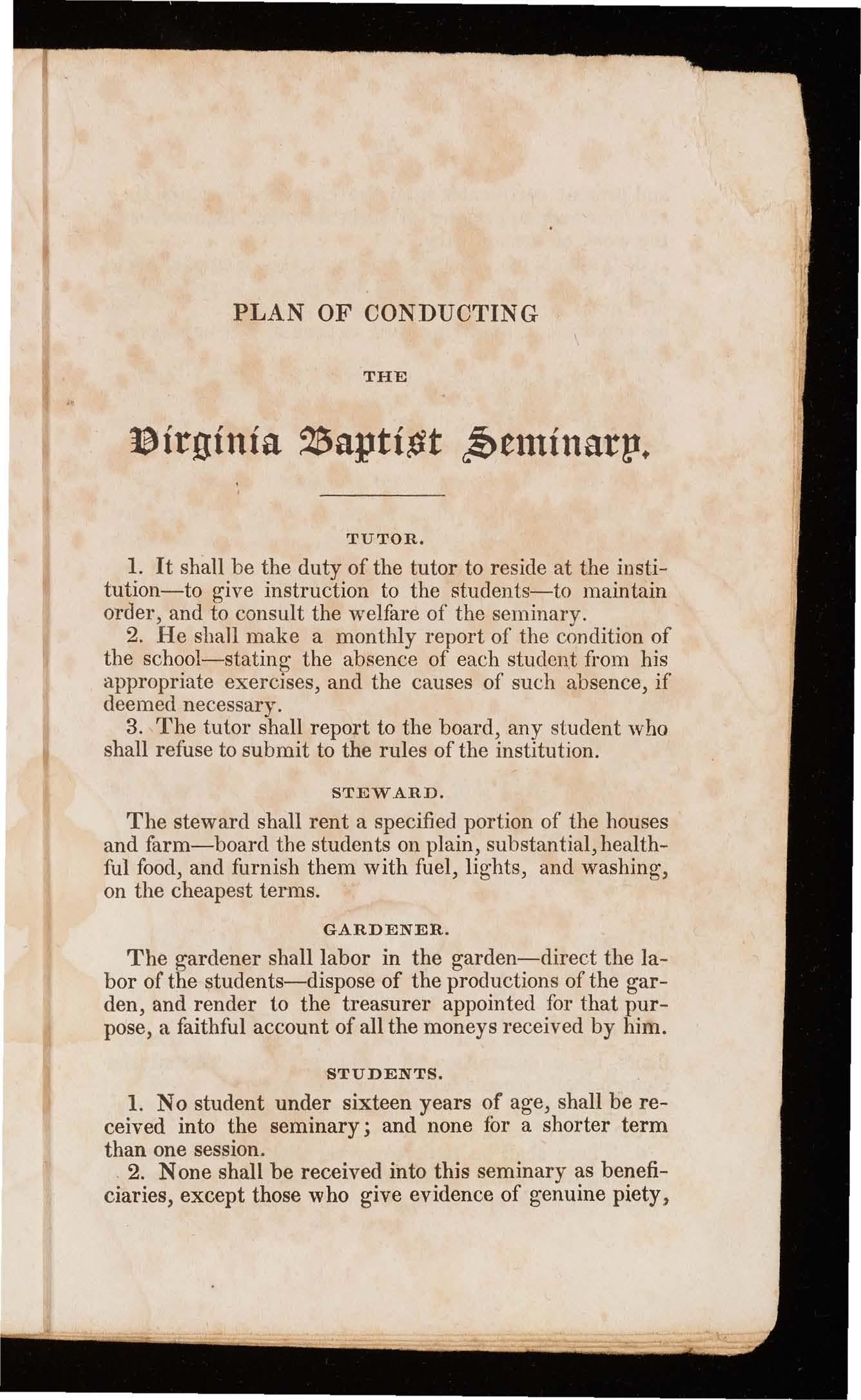
TUTOR,
1. It shall be the duty of the tutor to reside at the institution-to give instruction to the students-to maintain order, and to consult the welfare of the seminary.
2. He shall make a monthly report of the condition of the school-stating the absence of each student from his appropriate exercises, and the causes of such absence, if deemed necessary.
3. The tutor shall report to the board, any student who shall refuse to submit to the rules of the institution.
STEWARD.
The steward shall rent a specified portion of the houses and farm-board the students on plain, substantial, healthful food, and furnish them with fuel, lights, and washing, on the cheapest terms.
GARDENER.
The gardener shall labor in the garden-direct the labor of tlie students-dispose of the productions of the garden, and render to the treasurer appointed for that purpose, a faithful account of all the moneys received by him.
STUDENTS,
1. No student under sixteen years of age, shall be received into the seminary; and none for a shorter term than one session.
2. None shall be received into this seminary as beneficiaries, except those who give evidence of genuine piety,
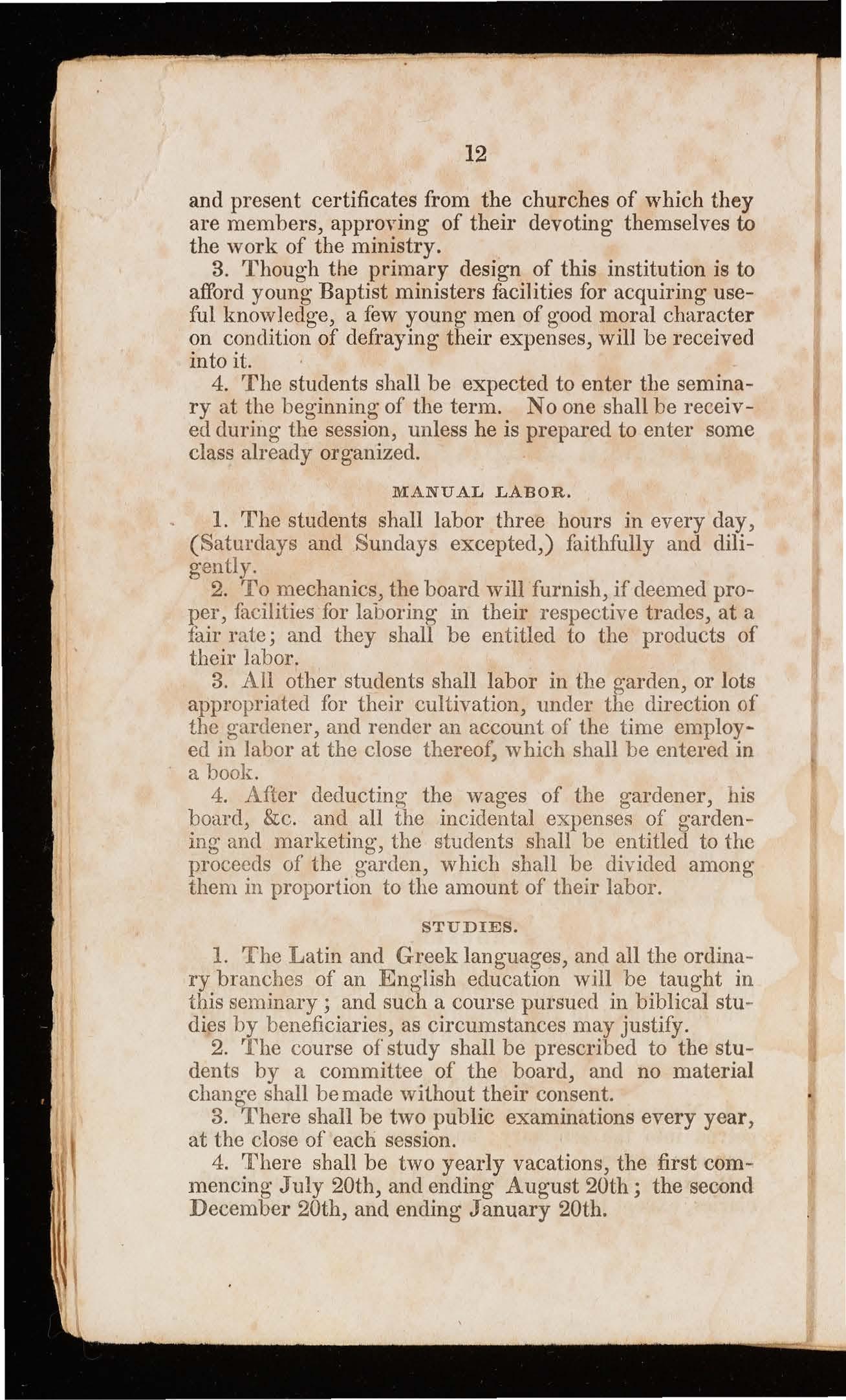
and present certificates from the churches of which they are members, approving of their devoting themselves to the work of the ministry.
3. Though the primary design of this institution is to afford young Baptist ministers facilities for acquiring useful knowledge, a few young men of good moral character on condition of defraying tlieir expens es, will be received into it.
4. The students shall be expected to enter the seminary at the beginning of the term. No one shall be re ce ived durin g the session, unless he is prepared to enter some class already organized.
1. The students shall labor three hours in every day, (Satu rdays and Sundays excepted,) faithfully and diligently.
2. To mec hanics, the board will furnish, if deemed proper, facilities for laboring in their respective trades, at a fair rate; and they shall be entitled to the products of their labor.
3. All other students shall labor in the garden, or lots appropriated for their cultivation, under the direction of the gardener, and render an account of the time employed in labor at the close thereof, which shall be ente red in a book.
4. After deducting the wages of the gardene r, his board, &c. and all the incidental expense~ of gardening and marketing, the students shall be entitled to the proceeds of the g·arden, which shall be divided among them in proportion to the amount of their labor.
1. The Latin and Greek languages, and all the ordinary branches of an En 00 lish education will be taught in this seminary; and such a course pursued in biblical studies by beneficia ries, as circumstances may justify.
2. The course of study shall be prescribed to the students by a committee of the board, and no material change shall be made without their consent.
3. There shall be two public examinations every year, at the close of each session.
4. There shall be two yearly vacations, the first commencing July 20th, and ending August 20th; the second December 20th, and ending January 20th.
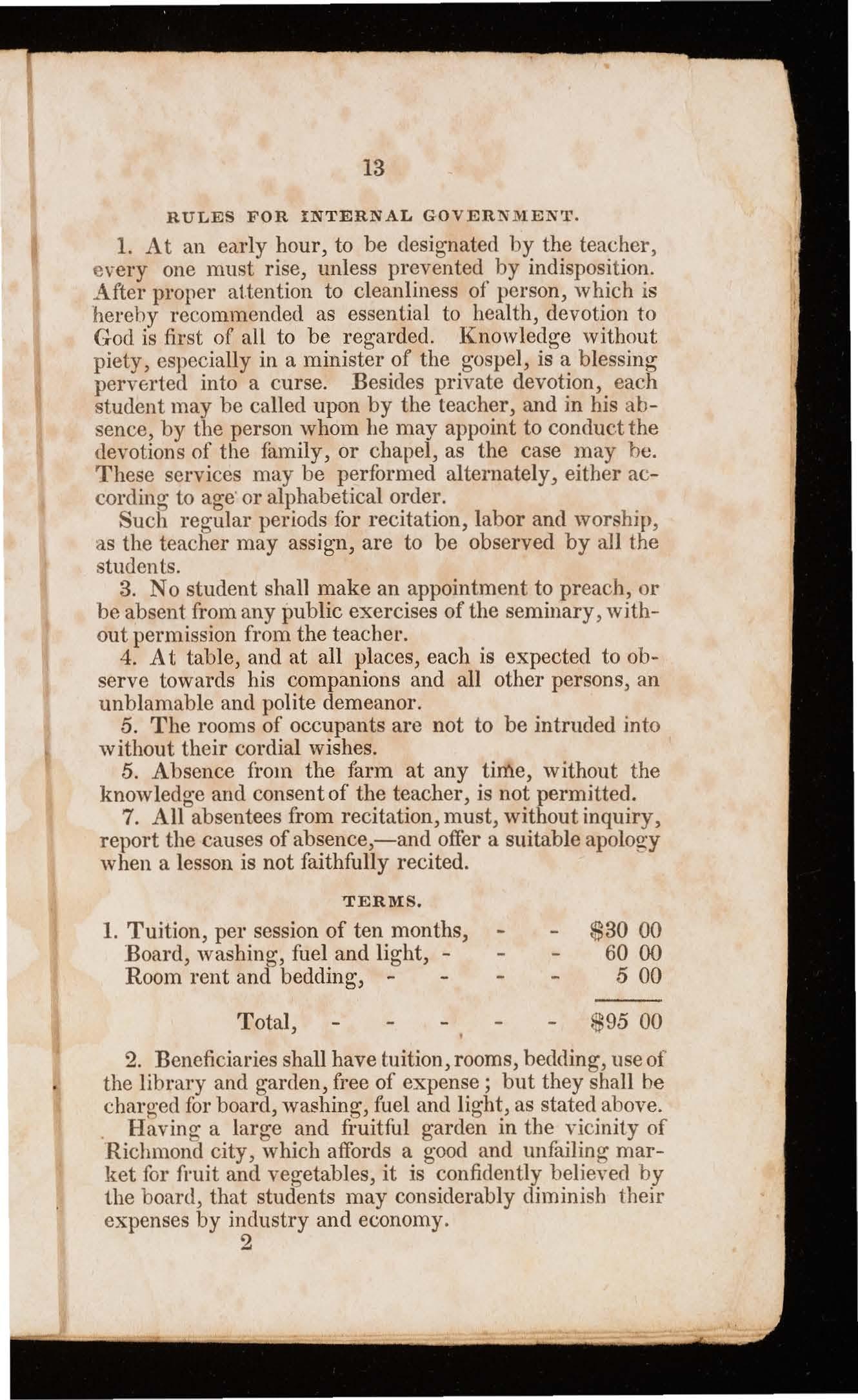
1. At an early hour, to be designated by the teacher, e very one must rise, unless prevented by indisposition. After proper attention to cleanliness of person, which is herehy recommended as essential to health, devotion to God is first of all to be regarded. Knowledge without piety, especially in a minister of the gospel, is a blessin~ perverted into a curse. Besides private devotion, each student may be called upon by the teacher, and in his absence, by the person whom he may appoint to conduct the devotions of the family, or chapel, as the case may be. These services may be performed alternately, either according to age·or alphabetical order.
Such regular periods for recitation, labor and worship, as the teacher may assign, are to be observed by all the students.
3. No student shall make an appointment to preach, or be absent from any public exercises of the seminary, without permission from the teacher.
4. At table, and at all places, each is expected to observe towards his companions and all other persons, an unblamable and polite demeanor.
5. The rooms of occupants are not to be intruded into without their cordial wishes.
5. Absence from the farm at any time, without the knowledge and consent of the teacher, is not permitted.
7. All absentees from recitation, must, without inquiry, report the causes of absence,-and offer a suitable apology when a lesson is not faithfully recited.
TERMS.
1. Tuition, per session of ten months, Board, washing, fuel and light,Room rent and bedding, -
2. Beneficiaries shall have tuition, rooms, bedding, use of the library and garden, free of expense; but they shall be charged for board, washing, fuel and light, as stated above.
. Having a large and fruitful garden in the vicinity of Richmond city, which affords a good and unfailing market for fruit and vegetables, it is confidently belieYed by the board, that students may considerably diminish their expenses by industry and economy.
2
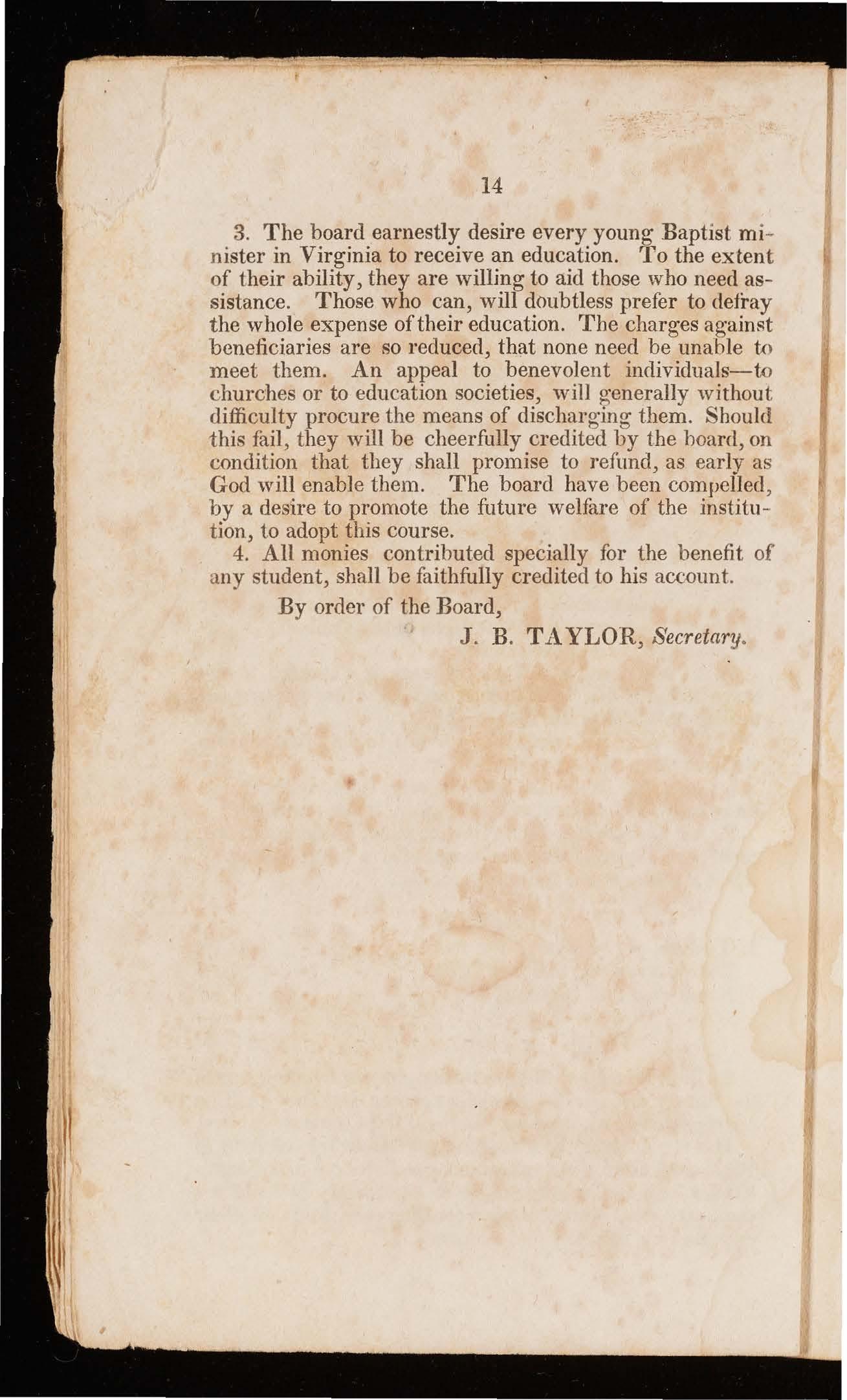
3. The board earnestly desire every young Baptist minister in Virginia to receive an education. To the extent of their ability, they are willing to aid those who need assistance. Those who can, will doubtless prefer to defray the whole expense of their education. The charges ag·ainst beneficiaries are so reduced, that none need be unable t-0 meet them. An appeal to benevol ent individuals-to c hur ch es or to education societies, will generally without difficulty procure the me ans of dischar g in g them . Should t his fail, t hey will be cheerfully credit ed by the h oarrl, on condition that th ey shall promise to refrmd, as ea rly as God will enabl e them . The board have been compelled , by a desir e to promote the future welfar e of the institut ion, to adopt this course.
4 . All monies contributed specially for the benefit of a ny stud ent , shall be faithfully credited to hi s account.
By order of the Board,
J . B . TAYLOR , Secretary .
FIRST YEAR OR CLASS.
ENGLISH, Grammar-Murray . Arithmetic-La Croix Geography- lVIaltebrun. Outlines of History-Lardner . LATIN, Grammar . Easy Reading . Caisar .
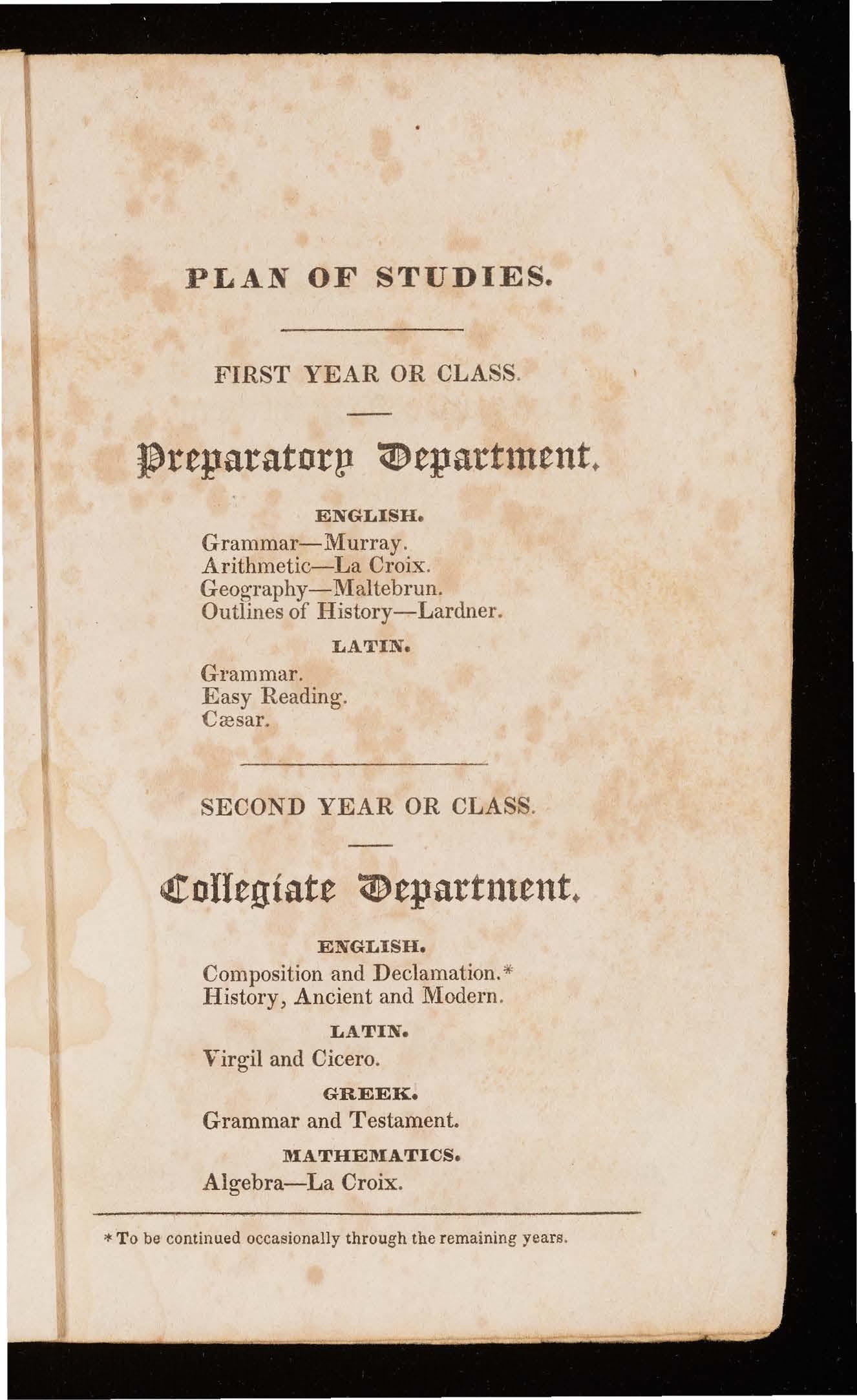
SECOND YEAR OR CLASS .
ENGLISH, Composition and Declamation .* History, Ancient and Modern LATIN, Virgil and Cicero. GREEK, Grammar and Testament. MATHEMATICS, Algebra-La Croix .
*Tobe continued occasionally through the remaining years
THIRD YEAR OR CLASS .
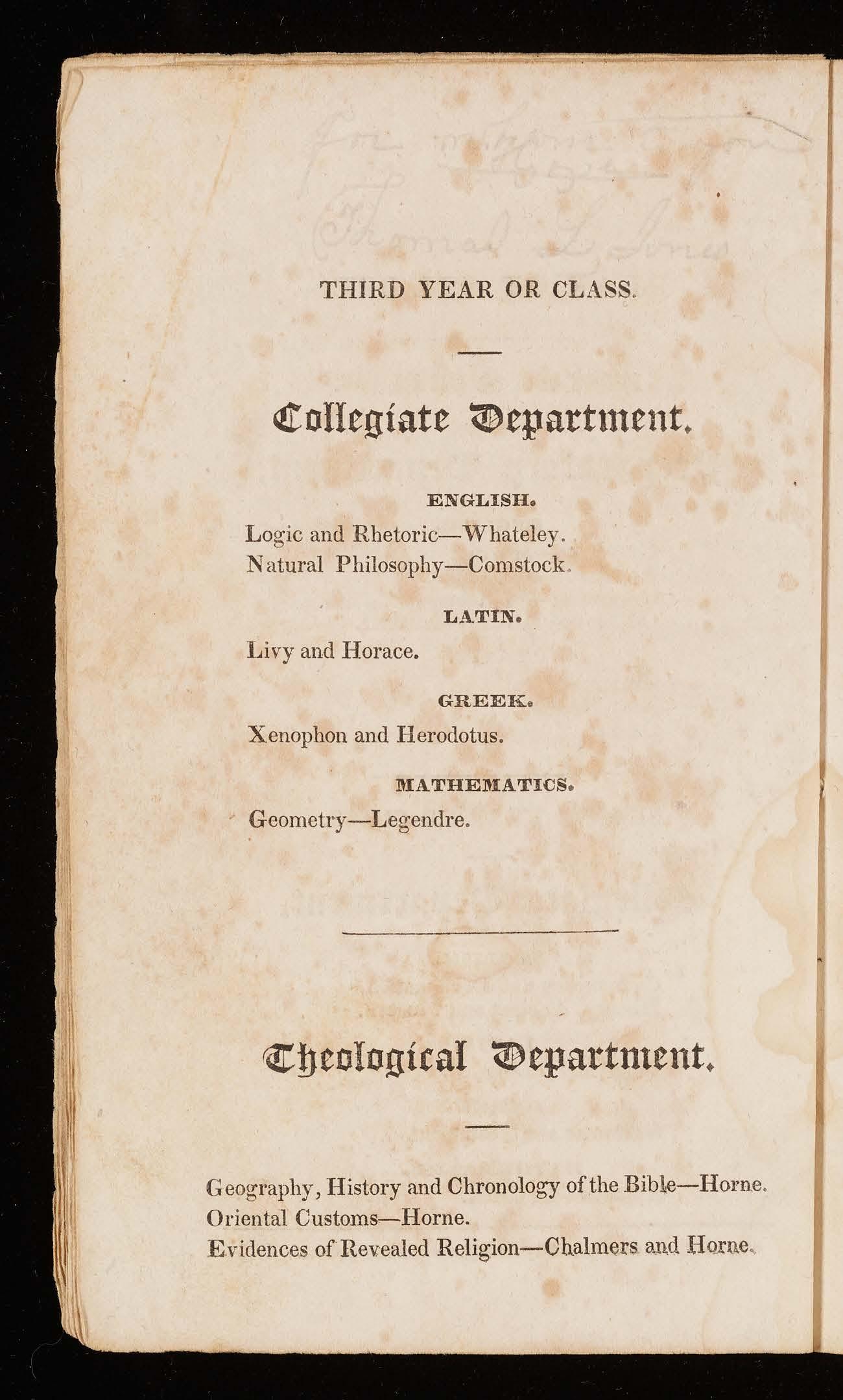
ENGLISH,
Logic ancl Rhetoric- Whateley . Natural Philosophy-Comstock .
LATIN, Livy and Horace.
GREEK, Xenophon and Herodotus.
llIATHEl'IIATICS, Geometry-Legendre . ~bcologfcal ~epartntent.
Geography, History and Chronology of the Bibl.e-Horne . Oriental Customs- Horne. E.viclencesofRe11ealed Religion-Ch.almers a,id Ho;:ne,

ENGLISH,
Philosophy of Mind. Moral Philosophy.
LATIN, Grotius de Veritate.
GREEK, ller()(lotus and Homer.
Laws of lnterpretation-Ernesti.
Natural Theology-Butler and Paley
Biblical Theology-The Scriptures.
Polemic Theology-Dwight and Fuller . Pastoral Duties.
This plan of studies is desig ned in its fullest extent, for those who have either entered, or are preparing for the ministry, not having the advantage of previous educaliion.
Any student who may be deemed by the examining committee capable of entering at once an advanced class, will have the period of his stay proportionably shortened .
Those students who may not desire to enter the Th eological Department, will have the option of attending the classes of the fourth year, at the same time with those of the third.
Those who may desire, with the consent of the examinino- committee, to pursue only an English course, will also 'be allowed to attend the appropriate classes of the second and third years contemporaneously . 2*
Rev. RonERT RYLAND. Rev. ELI BALL.
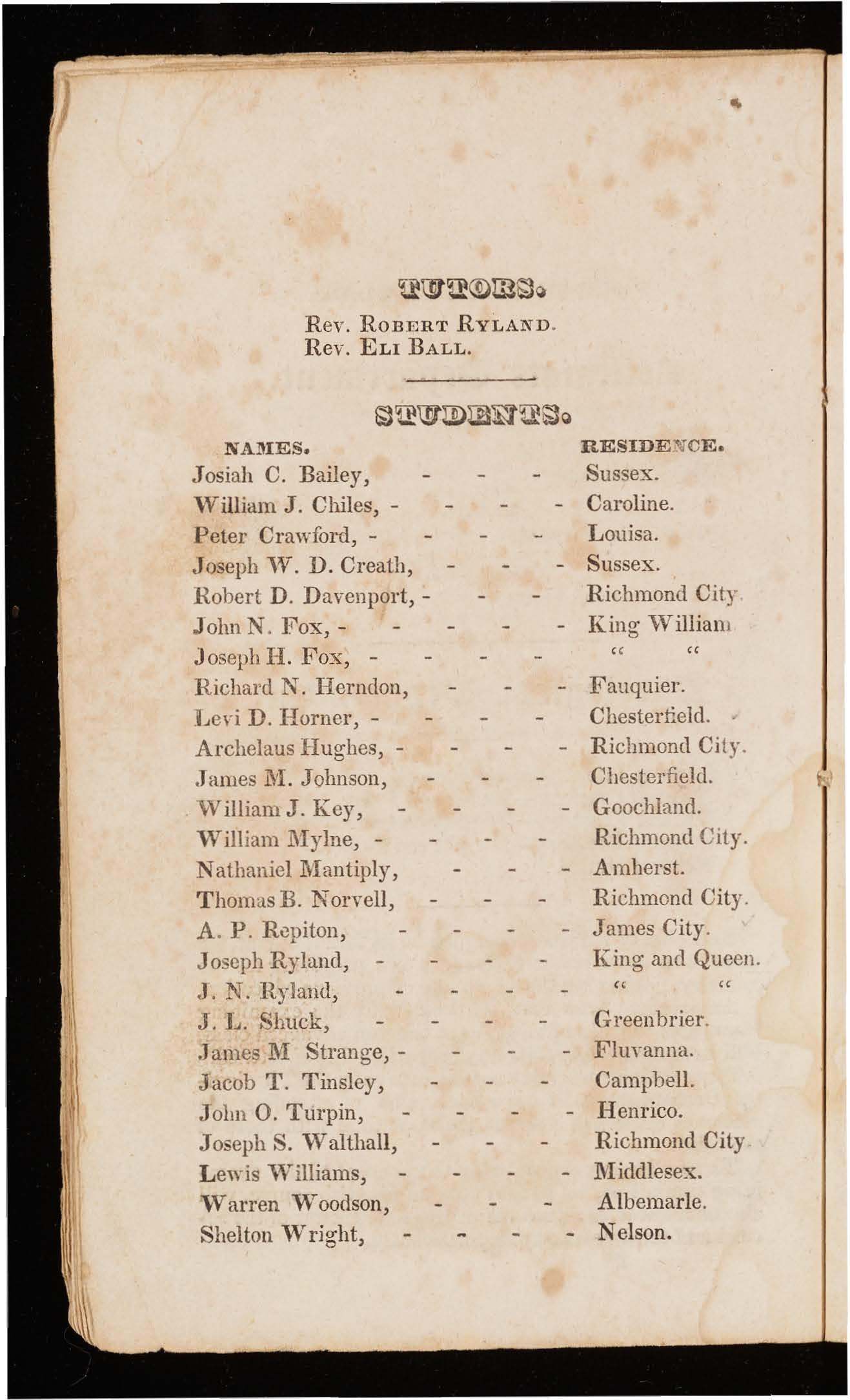
NAJIIES, RESIDE -VCE, Sussex. Josi ah C. Bailey,
William J. Chiles, -
Peter Crawford,Joseph ,v. D. Creath, Robert D . Davenport, -
John N. Fox,- Caroline.
Jos eph H Fox,Richard N . Herndon, Led D. Horner,Archelaus Hughes, -
Jam es M. Johnson, "\VilliamJ Key, Will iam l\Iylne,Nathaniel l\fantiply, Thom asB. Norvell, A. P. Repiton, Joseph Ryland,J. N. Ryland, J. L. Shuck, .James M Strange,Jacob T. Tinsley, John 0. Turpin, Joseph S. Walthall, L ewis ,vmiams, Warren Woodson, Shelton ·wrig ht, Louisa.
- Sussex . Richmond City
- King William "
- Fa uq uier. Chesterlield.
- Ri chmond City . Chesterfield. - Goochland. Richmond City. - Amherst. Richmond City . - James City . King and Queen " Greenbrier - FluYanna. Campbell. - Henrico. Richmond City - Middlesex. Albemarle . - Nelson.
t<~

A RTJCLFJI. This Society shall be denominated the " Virginia Baptist Educat ion Society."
An T. II. The design of this Society is to afford brethren of the Baptist denomination, regularly licensed to the work of the ministry, who giYe satisfactory evidence of their piety, g9od standing, call to the ministry, and capaci ty for improvement and usefulness, the means of acquiring knowledge to enable them with greater success to prea ch the Gospel of Christ.
ART. III. Any person who will pay the sum of two dollars annually, shall be a member of the Society. Any per son, by paying the sum of thirty dollars at one time, shall be a life member. Every Church or Society contributing the sum of ten dollars to the !imds of this Society, shall be entitled to one representative in this body, and another for every add ition al s um of ten dollars.
ART. IV. The Officers of this Society shall consist of a President, two Vice Presidents, a Recording and Conesponding Secretary, and a Treasurer.
ART. V. The Society shall have an ExecutiYc Board, consisting of the Officers and twenty five JVIauagers, who shall be members of th e Baptist denomination. The Board shall be chosen at every annual meeting, seven of whom shall constitute a quorum. It shall be their duty to adopt such·measures as to them may seem expedient, to increase the funds of the Society, and to secure their application according to its design, to procure teachers, to select beneficiaries, to designate their st udies, the conditio ns on which they are to be admitted, and the period of their continuance under the Society's patronag·e, to superintend all the concerns of the Society during its re cess, and to report their proceedino-s to the Society at their annual meeting. The Board shall appoint the time and place of their own meetings, and shall have the power of filling all vacancies which may occur, and of calling special meetings of the Society when in their judgment necessary .
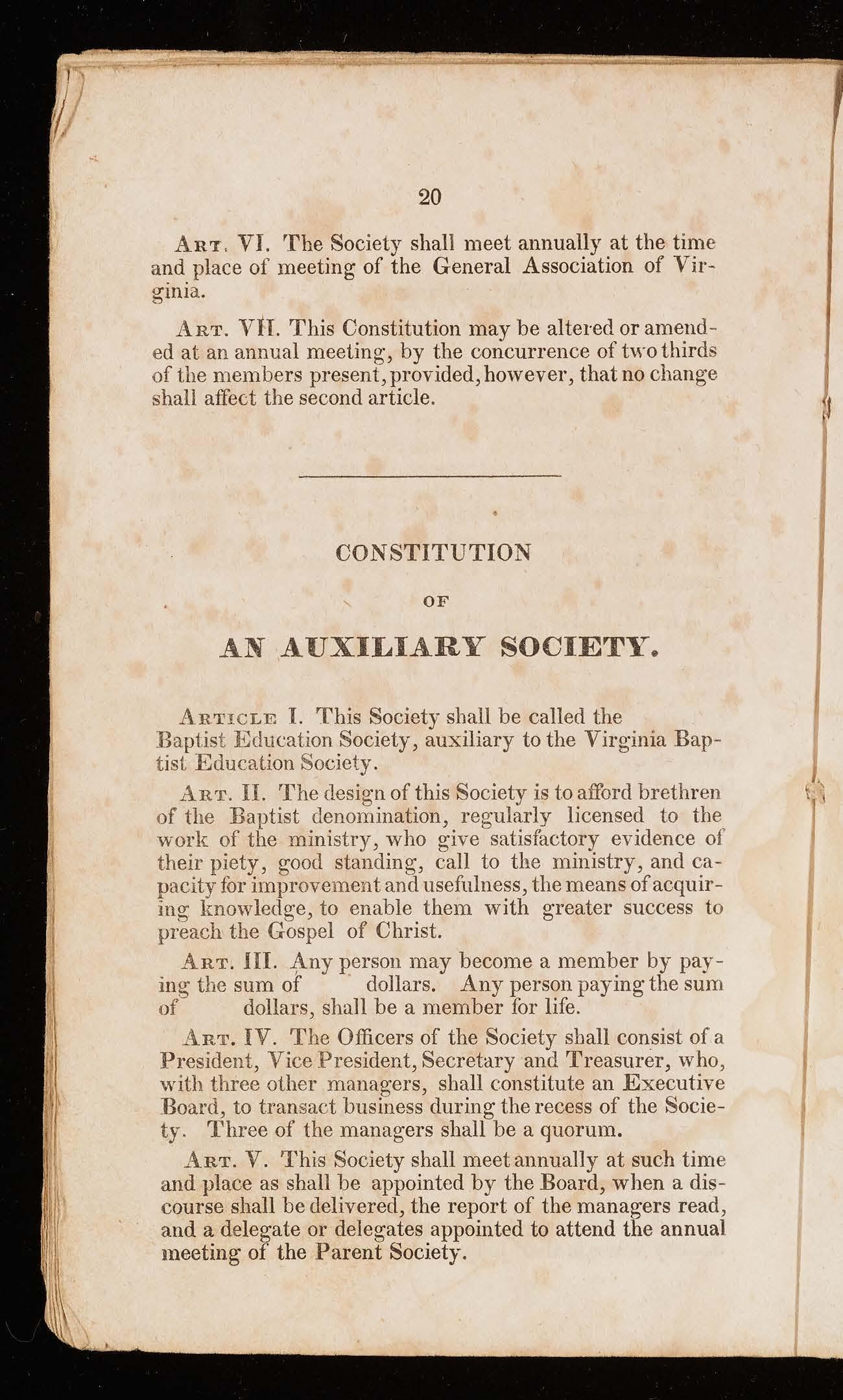
AR'I, VI. The Society shall meet annually at the time and place of meeting of the General Association of Virginia.
ART. VII. This Constitution may be altered or amended at an annual meeting, by the concurrence of two thirds of the members present, provided, however, that no change shall affect the second article.
ART IC LE I. This Society shall be called the Baptis t E ducation Society, auxiliary to the Virginia Bapt ist Education Society.
AR·r. II. The design of this Society is to afford brethren of the Baptist denomination, regularly licensed to the work of the ministry, who give satisfactory evidence of their piety, good standing, call to the ministry, and capacity for improvement and usefulness, the means ofacquiri ng knowledge, to enable them with greater success to preach the Gospel of Christ.
ART. HI. ,;\ny person may become a member by paying the sum of dollars. Any person paying the sum of dollars, shall be a member for life.
ART. IV. The Officers of the Society shall consist of a President, Vice President, Secretary and Treasurer, who, with three other managers, shall constitute an Executive Board, to transact business during the recess of the Society . Three of the managers shall be a quorum.
ART. V. This Society shall meet annually at such time and place as shall be appointed by the Board, when a discourse shall be delivered, the report of the managers read, and a delegate or delegates appointed to attend the annual meeting of the Parent Society.
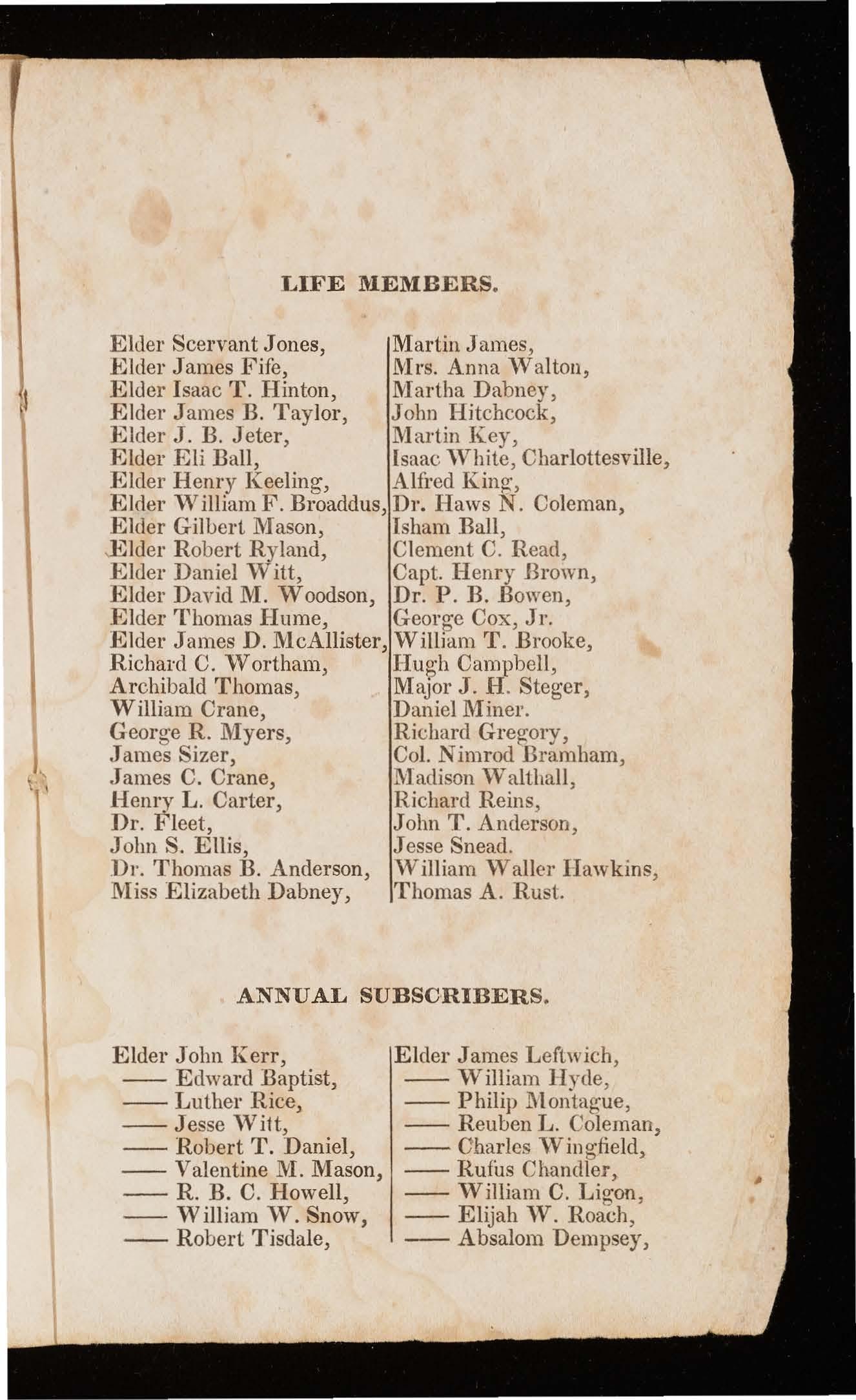
Elder Scervant Jones, Martin James, Elder James Fife, Mrs. Anna ,valton, Elder Isaac T. Hinton, Martha Dabney, Elder James B. Taylor, John Hitchcock, Elder J. B. Jeter, Martin Key, Elder Eli Ball, Isaac ,vhite , Charlottesville, Elder Henry Keeling, Alfred King, Elder WilliamF.Broaddus,Dr. Haws N. Coleman, Elder Gilbert Maso n, Isham Ball, ..Elder Robert Ryland, Clement C. Read, Elder Daniel Witt, Capt. Henry Brown, Elder David lVI.Woodson, Dr. P. B. Bowen, Elder Thomas Hume, George Cox, Jr. Elder James D. McAllister, William T . .Brooke, Richard C. Wortham, Hu~h Campbell, Archibald Thomas, Ma.ior J. H Steger, William Crane, Daniel Miner. George R. Myers, Richard Greg:ory, James Sizer, Col. Nimrod .Bramham, James C. Crane, Madison Walthall, Henry L. Carter, Richard Reins, Dr. l<'leet, John T. Anderson, John S. Ellis, Jesse Snead. Dr. Thomas B. Anderson, William Waller Hawkins , Miss Elizabeth Dabney, Thomas A. Rust.
Elder John Kerr, Edward Baptist, Luther Rice, -- Jesse Witt, Robert T. Daniel, -- Valentine lVI.Mason, R. B. C. Howell, William "\-V.Snow, Robert Tisdale,
Elder James Leftwich , "\-VilliamHyde , Philip Montague, -- Reuben L. Coleman, Charles "\-Vingfield, Rufus Chandler, William C. Ligon, Elijah "\-V.Roach, -- Absalom Dempsey,
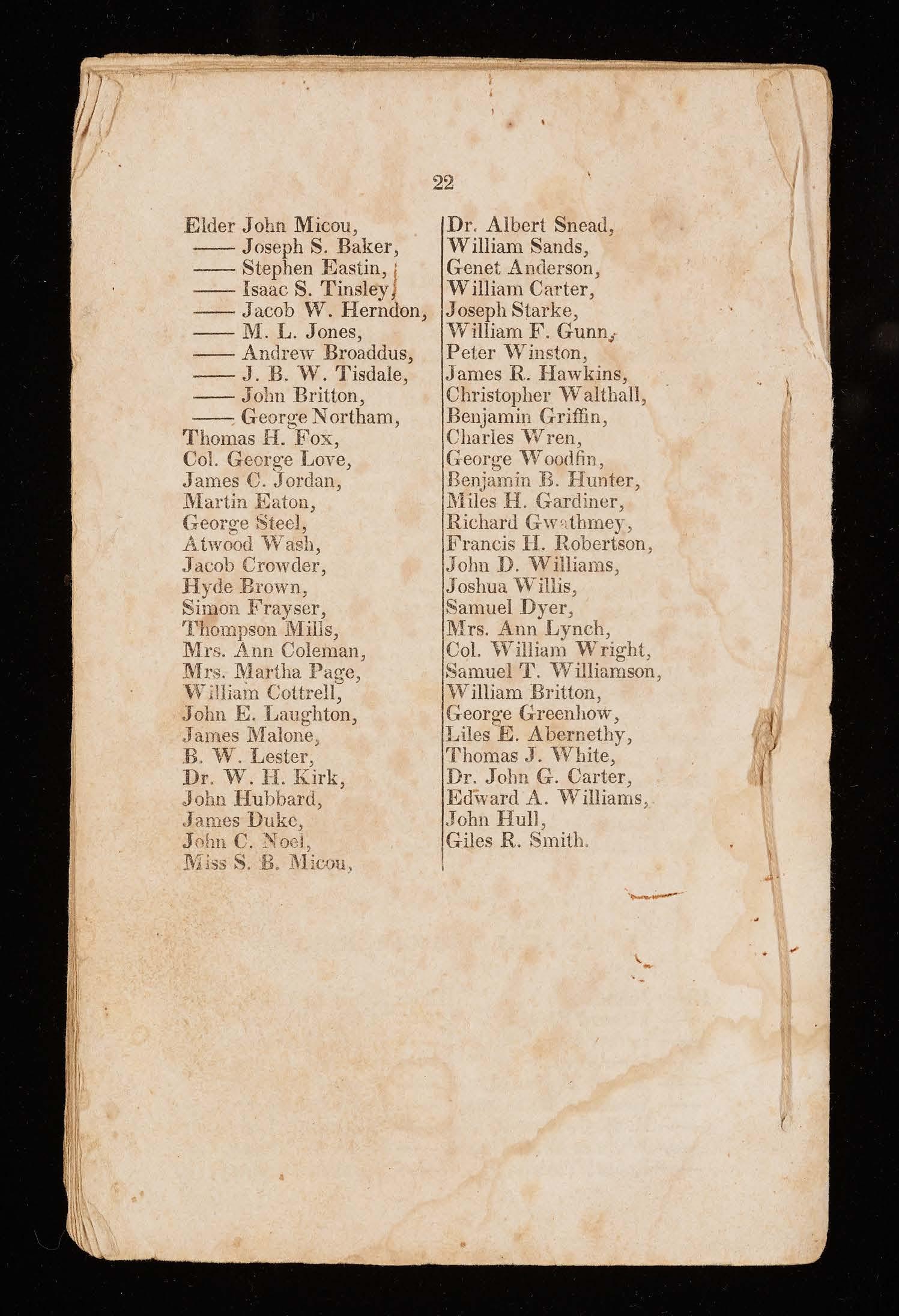
Elder John Micou, Jos eph S. Baker, -- Stephen Eastin, J' Isaac S. Tinsley Jacob W. Herndon, -- IVI.L. Jones, -- Andrew Broaddus,
-- J . B . W. Tisdale , John Britton, George Northam, Thomas H. Fox, Col. Ge orge Love, James C. Jordan, Ma r tin Eaton, George Steel, Atwood ,va sh, Jacob C rowder, Hyde Brown, Simon I<'rayser, Thompson Mills, Mr s . Ann Coleman, l\'Irs. l\'.lartha Page, W i lliam Cottrell, John E Laughton, James Malone , B '\V Lester, Dr W. 1-I.Kirk, John Hubbard, J a mes Duke, J ohn C. N oel, M iss S . 8 . :M icou ,
Dr . Albert Snead, William Sands, Genet Anderson, William Carter, Joseph Starke, William F Gunn ; P eter '½Tinston , James R. Hawkins, Christo pher Walthall, Benjamin Griffin , Charles Wren, George \V oodfin , Benjamin B. Hunter, M.iles H. Gardiner, Richard Gw -tthmey , Francis H. Robertson , John D. Williams , Joshua \Villis, Samuel Dyer , Mrs. Ann Lyn ch, Col. Willfam Wright , Samuel T. Williamson , William Britton, George Greenhow, Liles E. Abernethy, Thomas J. ,Vhite, Dr. John G. Carte r , Euward A. "Will iams , John Hull, Giles R. Smith .